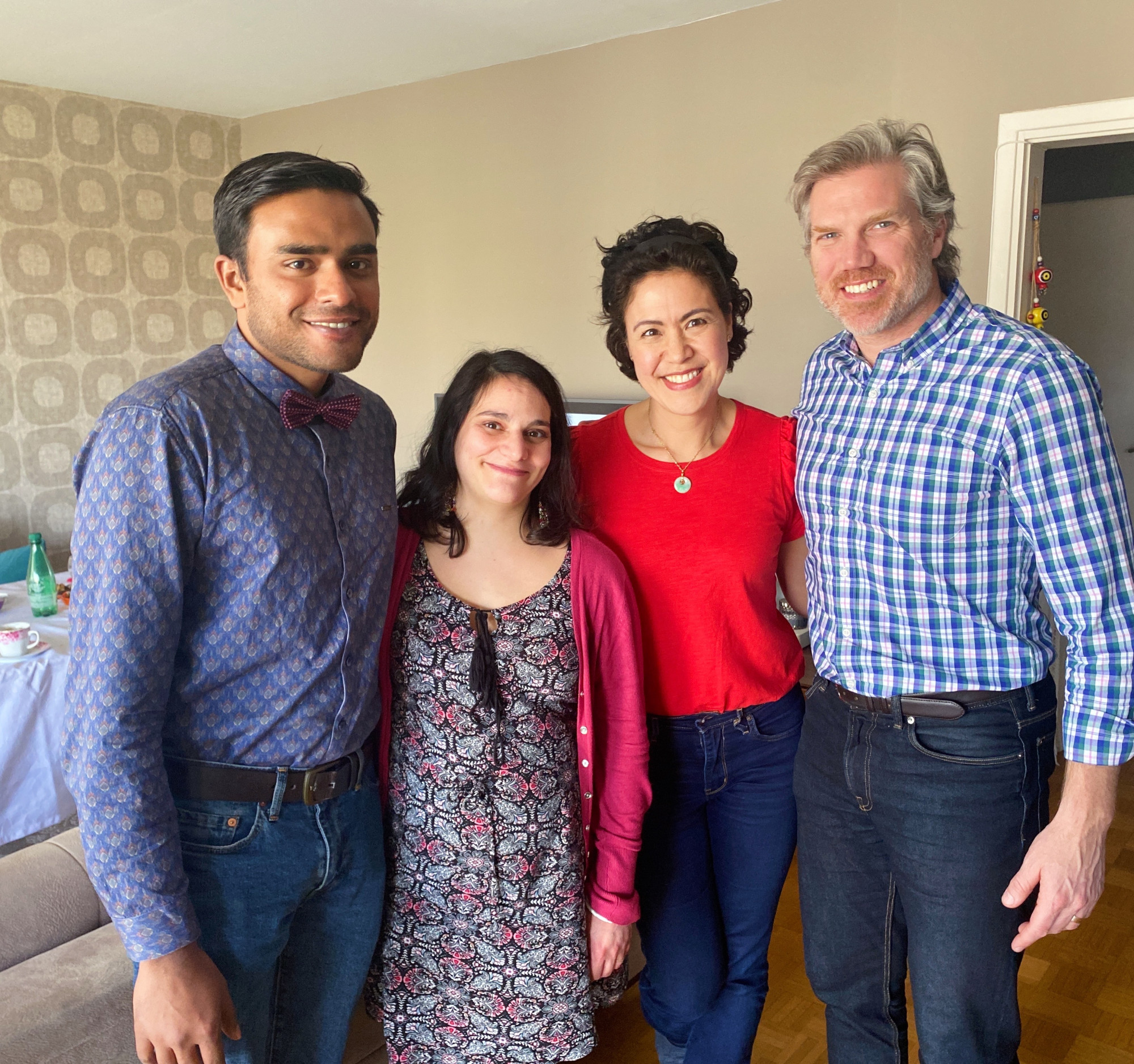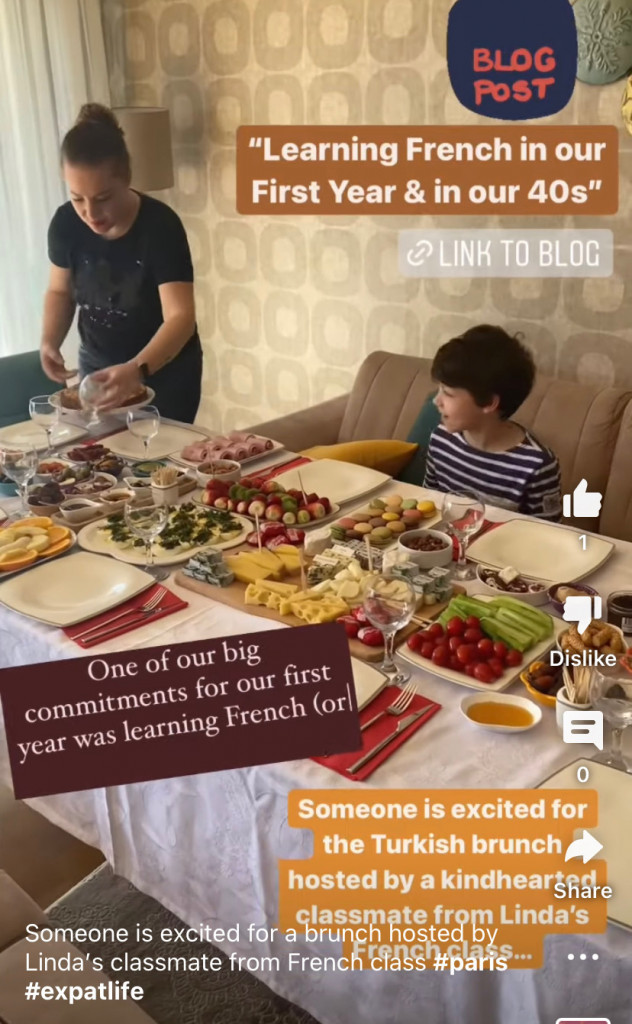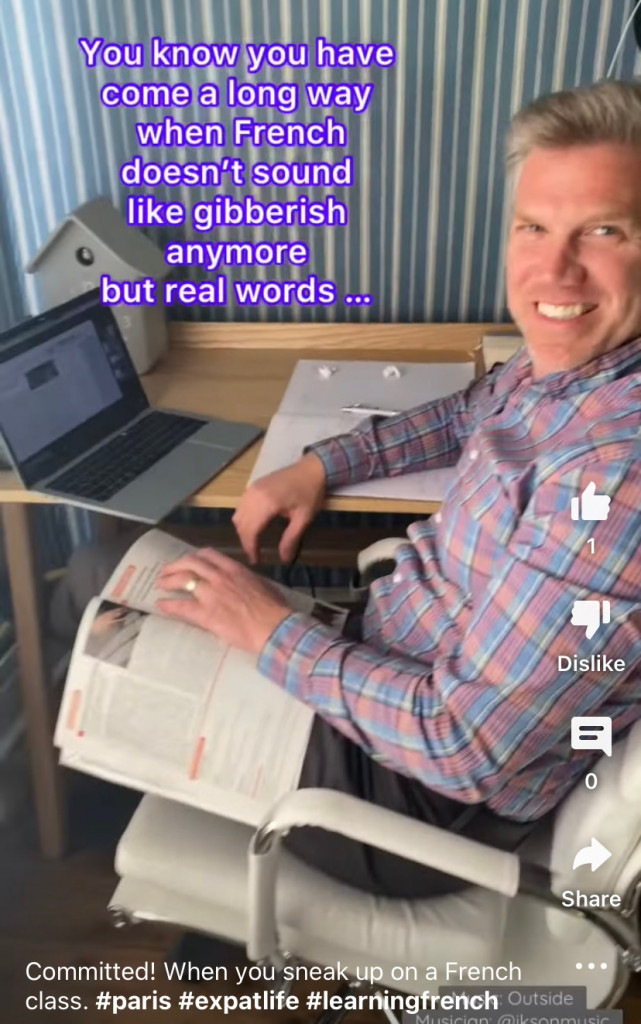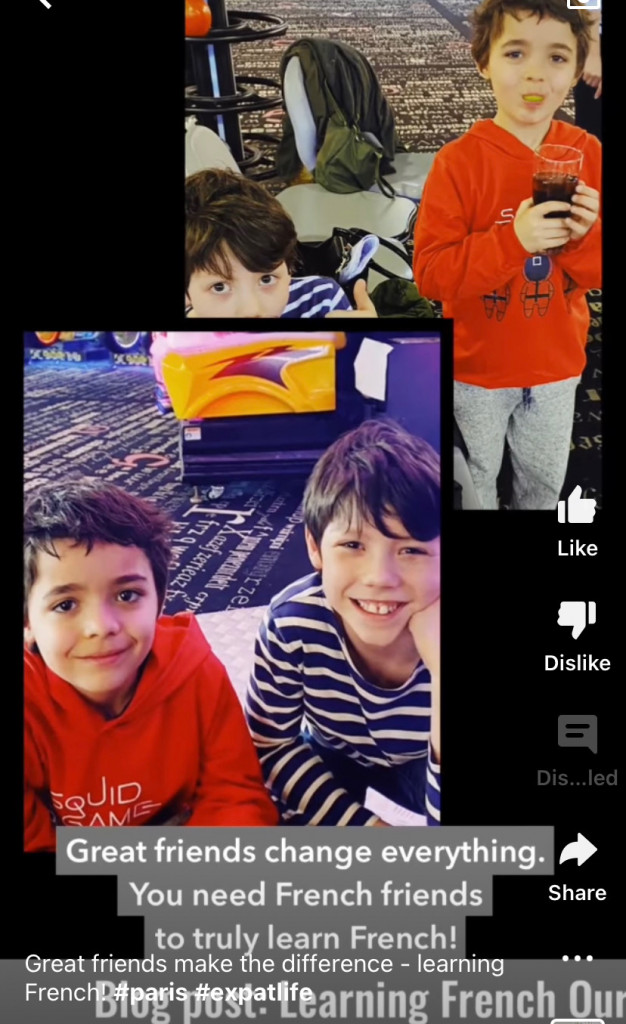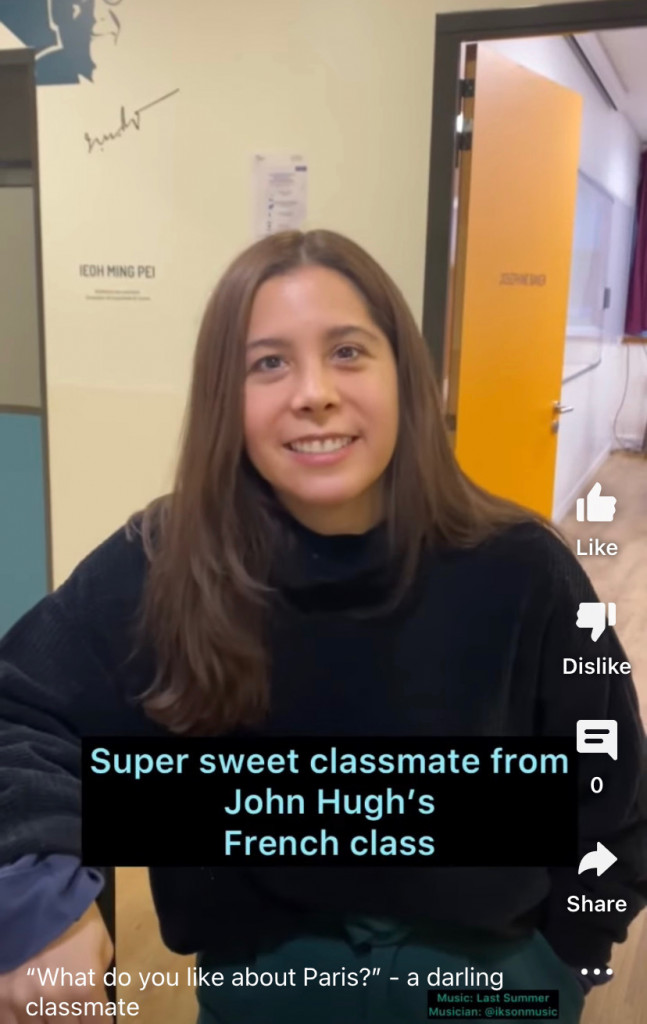Sunday brunch with Linda’s French teacher & her husband
Watch our 1 min video: Advice for learning French
– John Hugh
A big part of our commitment for our first year in France was learning French. We’re doing our best to honor that commitment. We’ve tried to throw ourselves into learning the language by classes, news, reading, and speaking when we can. In this process, however, we’ve found that we really enjoy learning French or simply just learning a new language. Now let’s be clear: it is difficult, challenging, and at times seemingly overwhelming. But we carry on, committed to learning to speak it and speak it as well as we can. And I can feel myself making progress, especially now after using French for the past 8 months.
It can be so easy to simply rest in speaking in English, and you probably could do so entirely in Paris. Yet language-learning itself is very interesting, at least I find it so: how someone communicates, how something is said or written. The French can be very colorful in their word usage – often much better than us in English, in my opinion. I feel like I learn something new every day. For example, in English, we say, “Press-Secretary” to describe or name the job of the one who speaks for a public official. In French, they call that person “le porte-parole“. A literal translation in English would be “the door of words”. So, in French, a press-secretary is someone who opens, or closes, the doors to the words said or not said by that public official. I think that’s really clever.
Our whole family is motivated to learn French – from taking language classes, going to French public school, watching French TV, and even reading books in French. We are learning a lot and being spurred on to want to learn more. I think this motivation springs from our attitude and overall philosophy of living here in France.
First, we knew such a move would be challenging. Yes, of course, people have told us that living in the Paris region looks like a dream or such a destination must be so great to live in. But talk to other foreigners, or missionaries here, and they will tell you the contrary. It can be a hard place, and it is a hard thing moving to another culture with another language, and staying here long-term. That said, ultimately for us, we hold the attitude or belief that you can’t really flourish in Paris unless you know the language. I can be debated on this. One can certainly live in France, or Paris, not speak any French at all, and love life here and fall in love with the city and culture. But I believe, to fully flourish, one has to know the language and know it well.
Initially, French is handy to simply get around: from trains to groceries to the basics of living. Yet more so (and living in France I’ve come to understand this more so), language is culture. So much of a people is not simply heard, but seen in a language. Some may debate that too. I don’t think the French would. Language is a huge part of their culture, much more than I even understand at this juncture. So to integrate as best you can as a middle-aged American, you should make every possible effort to learn as much French as possible.
Grinding away at learning French does pay off. I’ve seen it. The French appreciate your efforts. I have French friends who’ve seen our progress in six months. I’ve also had random conversations where the French person immediately shifts to English, as it’s easy to know my native tongue with my accent. That’s their gracious way of saying – “it’s okay, you can speak English to me.” I just keep talking in broken French. Sometimes I see a half-smile when they revert back to talking in (now slowly) French.
Learning French has built bridges and relationships for us, and that is what we’re here to do. This also goes to our philosophy of living here. We need to learn French, even if much of our ministry, at least initially, will be in English. We are connecting with internationals from all over the world. There are 3 million people in Paris who speak English, but at least another 12 million speak French. To live here then, those numbers do direct us. When you get down to it, it’s still a numbers game.
Thus, we’ve started intensive language courses. With my previous studies in French, I was able to begin at an intermediate level. Linda started at ground zero, beginner level. We’ve very much enjoyed our classes. I’d go so far to say I love my class. Our teacher is fantastic. Of course he’s French, yet even more, he’s engaging, helpful, and patient. I’m very glad I get to learn from him.
I’ve really enjoyed getting to know my fellow students too. The class is just so global, more than I imagined. So far, those I’ve met include students from Greece, Canada, Panama, Iran, Turkey, Mexico, Syria, Vietnam, India, Spain, Columbia, Bangladesh, and Afghanistan. I’ve been the only American in the class for quite a while. This is my first time to meet people from some of these countries. I’m now learning from them. I also enjoy the train/metro route to travel to class as well. It’s because to get there, I basically have to go across most of Paris. I get to see the diversity of people traveling to-and-from different metro and train stops. I love it.
So, while there are no blogs in French planned soon, I am enjoying the process of learning, writing, hearing, and speaking French daily. As noted, the class is intensive – meaning 20 hours a week intensive. With learning French, I’m also re-learning language itself. What I mean by that is how I communicate, the importance of language, and frankly, how I feel like I’ve missed out by speaking only English my entire life.
For example, in my French class, we can only speak French. So when you have a group of people who don’t know a language very well at all and are forced to speak that language, how do you communicate? The best you can – you find a way. It’s in our nature, our DNA. I’ve seen this too with our son with autism, who has significant language challenges, yet he finds ways to communicate. He just does. He puts the words he knows together.
I guess I just think language is a fascinating thing. We come from a tradition that says God “spoke the world into being” (Genesis 1). Christ Himself is called the Word, and “that the Word became flesh and dwelt amongst us” (John 1). I’ve always loved three passages in the Bible and how they connect, or reflect, one another.
The first is in Genesis 11 with the tower of Babel. Humanity’s pride desired to build a city and tower to the top of the sky. It says, “the whole earth had the same language and vocabulary.” This was when multiple languages were created and peoples became scattered throughout the earth. Then, in Acts 2, when the Holy Spirit comes down, the followers of Christ all began to speak in different languages. It’s the reversal of Babel. Where in Genesis 11, the people were trying to rise up with one language, in Acts 2, God comes down with multiple languages. Then in Revelation, in multiple chapters, it speaks to every tongue, tribe, and language, being together in heaven. So I do wonder – will we all speak the same language in heaven? Will we all be able to speak every language? No one knows of course, this side of things. Yet I think language, the different languages, will survive, and we will understand.
Language, multiple languages, are evidence of God’s good creation. It’s also evidence of His love for all creation. He doesn’t simply create the mountains and ocean vistas. He also created French, Spanish, Arabic, Hindi, Chinese, Italian, and I could go on and on. I’m thankful I’m learning French and re-learning language itself. It’s helping me consider how I communicate in all ways. This is something we all should keep in mind. Words matter. Language matters. And other languages, even beyond English, matter too.
– Linda
What do you do when you start over in a new language in a new country? It’s an exhausting, incredible, arduous journey to start a new language at 45. I am really crazy because I’ve never had a knack to learn languages. I was excellent at asking how to go to the bathroom in high school Spanish so I could roam the halls & chit chat with my friends. I lived one year in Vietnam after college attempting to learn my mother’s native tongue, and it was a near failure by the end. By my late twenties, I resigned myself to the awful truth: I am just not good at learning languages.
When we first arrived in France, I knew the inevitable would eventually sprung forth. I would delay learning French, give excuses on how my family needed me (which they desperately did) the first 6 months in France, and then come up with a mountain of reasons why French was just too hard to learn – even if I had cheated myself an honest chance to learn it. But instead of caving into this very familiar pattern, this time, I decided to do what was completely counter-intuitive and set my family up for a rollercoaster of months: I signed up for intensive French class within one month of arriving in France. John Hugh, on the other hand, didn’t start his French classes until 3 months after me, mostly because it was sheer survival mode and we initially couldn’t figure out how to do both at the same time.
My class was 20 hours a week, but when you include another 10 hours a week for travel time, it turned into 30 hours a week away from home. For a household that normally runs smoothly with a full-time stay-at-home mom, a homeschool mom, and in the past, very active pastor’s wife, it was a household turned completely upside down. Suddenly, John Hugh was Mr. Mom in areas he never dreamed, and I would rush home every day, scramble to make sure clothes, food, school, and basic necessities were moving in the right direction before tackling my French homework and shuttling kids to competitive swim practice.
All this wouldn’t seem too overwhelming if we were still in the United States. It would be similar to starting a new job. But to do it in the midst of a cross-cultural move where we have been emotionally and mentally exhausted every day trying to decipher a new language, live in a new home that is really suited for 1 person yet we are 5, keeping up competitive swim for our oldest with a minimum of 5 practices (2 hours each) a week, and as John Hugh stated above, deciphering a new cultural code of conduct was herculean. What were we thinking? I am surprised as a family we didn’t just fall apart.
On top of that, I struggled with nagging guilt about attending French class. For this first time in 14 years, I was serving no one but myself with my extra time. I was lucky to have the best teacher in the entire school as my teacher and fun-loving classmates. But in the back of my mind, I was counting all the ways our middle son was possibly falling behind in meeting his academic goals as John Hugh filled the gap in so many areas, but Mr. Homeschool, he was not.
Extricating myself from the daily rhythms of my family, however, meant I could plainly see how my family has not been trained to serve me, even though I serve them effortlessly and seamlessly that we could even say entitlement had begun to creep in. The guilt gave way to relief when I realized that this is all part of the grand plan: my family has had to buckle up and grow as a team for me to learn French, and it hasn’t been a bad project after all (more in a future blog post).
What has been the hardest thing in learning French as a near complete beginner? Realizing that you just can’t wing it and speak this language without knowing the grammar, and who wants to learn grammar! I was so frustrated for the first 6 months because every time I tried to put a sentence together, I was corrected by someone – the Uber driver, the old lady at the bus stop, the slightly uptight salesperson at the local bakery. I received either blank stares because my pronunciation was so bad or a correction that made me feel like I was 3 years old.
So how do you stay motivated to learn a language that is so difficult and is like learning two languages? For those who don’t know, academic French, what you learn in school, is a far throw from everyday French. You have to be conversant in both to write, read, and speak in French. I asked my oldest son what would you tell someone if they moved to France and wanted to speak French. He said, if you come here and just know all the grammar, you will fail. If you come here and know all the slang, you will fit right in. He added that you have to be French in your mindset – you have to learn to think and act like the locals to master the language. Such good advice from a 15 year old!
So how do I stay motivated? For me, I cannot live in a city with 12 million people I cannot communicate with. It drives me crazy that I still struggle to tell a joke or create small talk after 6 months of French class. I am super motivated because I cannot live without community. I am killing the last vestiges of perfectionism to learn French – it’s been a slow death since 2018. John Hugh is fearless with his French. He will cobble together words and start speaking. Our first few months, I would only allow myself to be his shadow because I wouldn’t dare open my mouth. But now, I am frustrated that he beats me to the punch, starts speaking the French before me, and therefore dominates the conversation. I am still slow in speaking because I think in English, so I need a patient listener, but I am more excited to try than scared to fail. An achievement!
Most of all, I have great empathy for anyone making a cross-cultural move as an older adult. I think of immigrant families where you meet the grandparents who speak possibly no English or the native tongue of the country they migrated to. Is their inability to communicate a sign of lack of intelligence? I am hoping for the exact opposite when I attempt to speak French. Language is currency and we assign so much prestige and power to words. But language also opens up new worlds, new relationships that would never be built unless you had the courage to fail and start over with new vocabulary, new sounds, or even a new alphabet. It is an astronomical climb for older adults. Language is easier the younger you learn it, so please be kind and courteous to us old folks.
I love a challenge, and I underestimated what a challenge learning French would be. But I am so glad I didn’t shy away from the challenge with fatalistic phrases that can easily creep into a middle-aged person’s vocabulary. “I can never do that,” or “I am too old to do that”. Really? What dreams have you tucked away into never-never land because you assumed you are incapable before you gave it your best shot? Learning French at 45 is not easy, but every single day, I am so proud of myself. Isn’t that what we teach our kids? To try hard things, to push themselves in reaching their potential because they aren’t even quite sure what their potential is?
I am thankful that my kids see me growing and failing and getting back up again in learning French. They know I am just as lost as them, but I am not giving up. Our youngest has the best accent by far, but I know my middle child with special needs will never learn French unless I have a fair grasp of the language to speak it at home. Ironically, I remember telling a good friend that I would pick up learning a second language after our first baby was born because how hard can it be to take care of a baby? Clearly, I was an embarrassment to myself in how little I knew of motherhood, but this desire is circling back in the strangest way.
This past month of April, I decided to take a break from my intensive language class because my reading and writing are outpacing my speaking and listening. I need some time to practice speaking and interacting in French in real life instead of rushing off to class every day. I hope to re-start my classes in September 2021, but I would challenge any over-stressed, over-booked, over-extended person out there to find the one thing that is life-giving, energy-boosting, outside-the-norm to him/her and place a stake in the ground to make it happen. It is hard. Things will bow and bend in different directions around you, but you won’t regret not trying. I can’t wait to share more lessons, more quirks, and the genuine hilarity of learning a foreign language after 40. This language journey will take more than a year, but I know the fruits will last far beyond that.
A quick peek in our daily life or watch all our YouTube Shorts here.
Someone is excited for a brunch hosted by Linda’s classmate from French class
Often we are the only Anglophones in our French classes
When you sneak up on a French class
Great friends make the difference
“What do you like about Paris?” – a darling classmate.
John Hugh loves his French Language class
Thanks for reading!
Become a Paris Partner:
MAKE A GIFT or ARRANGE A GROUP TO VISIT
Living through COVID-19 has taught us that seasons can change, timelines can change, but God’s mission does not. Read our vision for Paris (3Ps for Paris) & think about becoming a Paris Partner today. Our Partners are the reason we can be in Paris to plant churches.
Interested in Our Daily Life?
Watch our Shorts on our YouTube channel. Find us also on Instagram, Facebook, and Twitter. But don’t forget to subscribe to our blog, so you never miss a post.

